Lying through the Ages
Why Do People Lie?
From Little Kids to Men and Women of All Ages: Why Do People Lie?
I remember when I was about 5 years old, the storm door to our house, had a decorative attachment with a swirl in it, and I remember thinking, my thumb would fit perfectly in that swirl. I put my thumb in, and I couldn’t get it out. My mother walked by the other side of the door and saw me standing there with my thumb in the swirl. She asked me if my finger was stuck, I said no. It was an innocuous lie to protect myself from getting yelled at. I knew my finger was stuck, but I didn’t want to admit it. Luckily,a few minutes later my mother came by with pliers, and so in large part to her not believing me, my thumb and I are free and I am able to do my writing.
Little kids tell little lies, or may make up stories. Believe it or not, it is a natural part of growing up, and actually considered healthy signs by child psychiatrists, as a healthy part of growing up. Lying by teenagers, and adults is not the same as the untruths told by children. It is believed that lying in children happens in a different part of the brain than in adults. Lying as children, is thought to be a sign of intelligence. Preschool age children who have cognition skills and higher IQ scores are more prone to lying. This is also associated with.proper developmental of social skills as they enter adolescence. Although none of us want to condone lying, there may be such a thing as age appropriate lying. Young children don’t usually know there is a difference between the truth and the lies, and lying as a child is usually a developmental milestone. This doesn’t mean to excuse the lying, it is advisable to encourage your child to tell the truth. It should also be explained to them why lying is wrong. When a child confesses that they did lie, it best to avoid punishing them for lying, and rather encourage them for coming forward with the truth. Lying is children is studied because it is believed that the untruths told are showing the development of executive functioning in the brain, which is a good thing. Lying involves using multiple parts of the brain, keeping the truth in mind and then manipulating the information, thereby using reasoning and higher order thinking skills..
Lying is done more often than we think

Children of All Ages Lie
- Toddlers ~ usually tell self serving simple lies. Generally they will not admit they knocked the plant over to protect themselves from blame. They don’t admit they have to go to the bathroom. These fibs are usually harmless.
- Preschoolers ~ At this age many kids have imaginary friends that they insist you admit are real. Usually preschoolers tell tall tales as an extension of their imagination. These fantasies are usually harmless as long as you can see they have true and realistic relationships with important people in their lives. Usually these types of lies are way of processing new ideas. Children start to lie at this age to avoid getting in trouble. It is appropriate for children to avoid getting into trouble or to try to use deception to get what they want.
- School age ~ at this age some children will a white lie to protect another person or not hurt someonelse’s feelings. This is prosocial behavior,and is an appropriate demonstration of social awareness, and of sensitivity towards others. Kids at this age will also tell bigger lies to avoid punishment or disappointing someone. Usually there are logical reasons for them to resort to lying.
- Tweens ~ usually this age group from about 9-13, gloss over details and tend to keep secrets, especially from their parents. Maturation is part of the reason for their omissions. It is a natural part of growing up and away from their parents as a part of gaining independence. At this age, small untruths like saying they did their homework when they didn’t is usually a normal response. However, children who begin to lie chronically, may need to talk to a mental health counselor. It may be that the child is feeling anxious and don’t know what to do about the issues they are facing. Lying could be a symptom of the stresses they are enduring. They also may be lying out of rebellion. Lying may also a way to boost their self esteem when they say they met someone famous, as an example. Again, repeated lying may be a sign of low self esteem and perhaps consider taking the child to talk to a therapist to get to the root of the issue earlier, rather than later. Preteens also learn that lying is a way of control. They learn they don’t have to tell all the information they know, and so they lie by omission..
Teens Tell Lies
Chances are good that children will outgrow the white lies, the fibs, the small untruths. It is especially good to lead by example, and have open and honest discussions about the effects of lying and the reasons truthfulness is the best way to live your life.
- Teenagers ~ There are times when a teen will exaggerate a truth, or not tell the whole truth. When these lies involve unimportant or irrelevant information, they are probably telling a story to gain something or as avoidant behavior. Sometimes it is to get attention, feel more powerful, gain sympathy, or due to an inability to problem solve. It is especially important to be aware se when teens are lying and are involved in risky or illegal behavior.
- Adults ~ Adults lie for varying reasons, similar to children. They may be white lies, like you look great in that dress, or “There was a lot of traffic and that is why I am late”. These lies are usually done to protect themselves from situations that are relatively harmless if caught. Boasting lies are stated to enhance the person’s self esteem, so they sound better than the situation really is. Someone may lie to protect themselves or someone they care about from harm. Some people lie to avoid embarrassment,. Others lie for the sheer power of getting away with telling untruths and the feeling of control and manipulation of others. And then, there are more serious lies. There are lies by exaggeration, and omission, because the individual is trying to gain something over someone or deceive someone else. Some people lie to cover up misdeeds like those of infidelity, or lies to cover up criminal activity because rules were broken and the person protects themselves from punishment. There are pathological liars, those individuals who can not tell the difference between truth and lies, between reality and imagined scenarios.
Adults Lie for Many Reasons
- Adults ~ Adults lie for varying reasons, similar to children. They may be white lies, like you look great in that dress, or “There was a lot of traffic and that is why I am late”. These lies are usually done to protect themselves from situations that are relatively harmless if caught. Boasting lies are stated to enhance the person’s self esteem, so they sound better than the situation really is. Someone may lie to protect themselves or someone they care about from harm. Some people lie to avoid embarrassment,. Others lie for the sheer power of getting away with telling untruths and the feeling of control and manipulation of others. And then, there are more serious lies. There are lies by exaggeration, and omission, because the individual is trying to gain something over someone or deceive someone else. Some people lie to cover up misdeeds like those of infidelity, or lies to cover up criminal activity because rules were broken and the person protects themselves from punishment. There are pathological liars, those individuals who can not tell the difference between truth and lies, between reality and imagined scenarios.
How many times do people lie when talking to others?
A psychologist named
Robert Feldman did a study and found that in the majority of people in
the told an average of 2-3 lies in a ten minute conversation. The study
involved 121 pairs of college students from the UMass. The amount of lies
told in everyday conversation surprised even the researchers. In the study, men
and women lied for different reasons. Women tended to lie to attempt to
help the other person feel better. Men lied mostly to make themselves
look better. When the participants watched themselves on video tape, they too
were surprised by how much untruths they told. The lies mainly consisted of
innocuous lies like agreeing that they liked the birthday present, when
they really didn’t, although some were more boasting like they were members of
a rock band. And while we try to teach our children honesty, they pick up
mixed messages from us in our everyday interactions.
Pathological liars fit
into a different psychological category. In MRI studies, it was found these
people had more white matter than gray matter in the brain as compared to
people who were not pathological liars. You can read more about these and other
types of lies in my future articles about mistrusts, misdeeds, and
misrepresentations.








